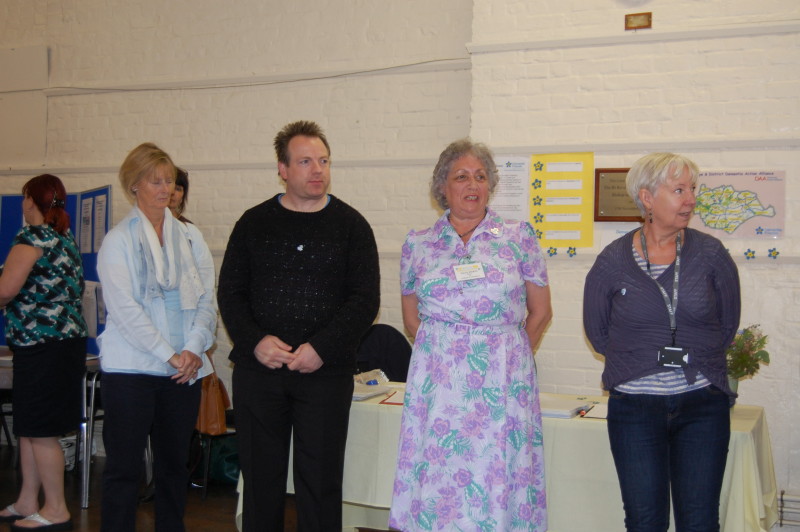The new dementia champions for Rye and District chose Dementia Awareness Week to launch their campaign on Tuesday May 21 and stalls at St Mary’s Centre in Lion Street were manned by representatives from the Alzheimer’s Society, Rother Seniors Forum, Five Villages Home Association Ltd (Icklesham), the Sussex Police and other bodies. Visitors were welcomed with tea and cakes as they gathered help and information.
Daliea Redman, chair of the newly formed steering group for the Rye and District Dementia Awareness Action Alliance (pictured above), outlined the objectives of the group which were to improve the lives of people living with dementia and their carers by raising awareness and making Rye a more dementia friendly town. The alliance, made up of organisations across the district, seeks to engage with local businesses, public services and independent bodies, encouraging them to join the scheme and adopt a short individually-tailored action plan, setting out what they can do to make a difference. For further information contact RDDAA@outlook.com
Around 850,000 people in the UK have dementia, a disease which attacks the brain, and it is an increasing problem , but Dementia Awareness Week is designed to answer some basic questions with help from the national Alzheimer’s Society who can be contacted at www.alzheimers.org.uk or on 0300 222 1122.
Q. I can become forgetful or confused. Do I have dementia?
A. Some of us do struggle with our memory as we age or during times of stress or illness. But dementia is different. Lots of people momentarily forget a friend’s name – someone with dementia may forget ever having met them.
Q. I am worried about my memory.
A. Make an appointment to see your GP who can help rule out other conditions similar to dementia and that may be treatable. These may include a range of things including depression, chest and urinary infections, severe constipation, vitamin and thyroid deficiencies and brain tumours. And your GP may refer you on for further investigation of your symptoms and a full diagnosis.
Q. How quickly will it affect me?
A. Assuming you actually have it, dementia is progressive – but many people stay independent for years. There’s no known cure, but there are ways of helping with the symptoms and making life better at every stage. And the more we understand about the condition the more we can do to help people stay independent and live the life they want as long as possible.
Q. Is there nothing I can do?
A. There are medications available that may help with some types of dementia and stop symptoms progressing for a while….and that is one reason why it’s important to go to your doctor as soon as you think there might be a problem. This can feel like a very big step to take, but a diagnosis may calm your fears – or it can open up many opportunities to help overcome problems and find better ways of coping.
Q. Will I have to cope on my own?
A. Of course not. But dementia can make you feel lonely and isolated. So two useful numbers to know are the Alzheimer’s Society’s office in Battle (01424 773687) and their East Sussex Helpline (01403 213017 – weekdays 9:30am-4:30pm) or email sussex.helpline@alzheimers.org.uk.



